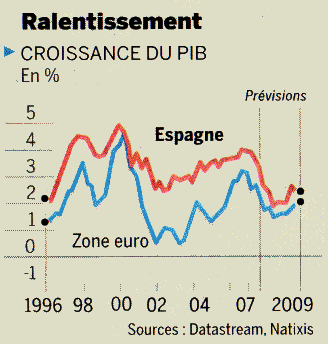
Spain no longer has the "movida"
Le Monde, 24/25 February 2008
by Eric Le Boucher
Just a month ago, Josť Luis Zapatero, the Spanish prime minister, socialist, campaigning for the parliamentary elections of March 9, promised its fellow citizens to "catch up" with France before the end of the next parliamentary period, in terms of wealth per capita. Spain, currently ranking sixth in Europe, would become richer than France, ranking fifth (behind Ireland, Sweden, the United Kingdom, and Germany)? Considering its growth rate (averaging 3,7% over the past ten years, higher than the United States!), the bet did not seem unrealistic.
Today, a month later, Josť Luis Zapatero doesn't boast anymore. He is under threat from its right-wing rival from the Popular party, Mariano Rajoy. And this is for economic reasons. Spain, a model of economic success for the past twenty years, is assailed by doubts.
The confidence of voters-consumers in their government has reached its lowest mark since the 1992-1993 recession. The real estate boom, which pulled economic growth, is clearly over. Real housing prices, which have doubled since 1998, are now on a declining trend, and the whole sector is threatened by depression. Yet, inflation stays high at 4% - higher than elsewhere in Europe. Unemployment, which was thought definitely under control, thanks to labor laws enforcing flexibility, threatens to rise again.

The government, which must defend its record, explains that the world economic slow down is the cause, and that its policy has nothing to do with it. To no avail: Spaniards are aware that the post Franco golden years of economic development are a thing of the past. Why is that? Spain's development benefited from four engines, and all four are running out of fuel, explain economists from Natixis. European financial assistance, to start with. The kingdom was the largest beneficiary of structural (regional) funds, of funds for social cohesion, and of agricultural funds. Their global contribution peaked at 1,7% of GDP between 1994 and 1999. Over the coming period from 2007 to 2013, Spain will still receive 31 billion euros, but this will only represent 0,4% of GDP. This first engine is stalling.
The second engine was automotive subcontracting. All European automobile manufacturers had set up delocalized facilities across the Pyrenees, where workers' salaries were 30% lower than in France. Some 300 000 jobs were created in the sector. But since 2000, Volkswagen, Renault, Daimler, Ford go the Eastern Europe, to Morocco, or farther. Third dynamics: tourism. The sun attracts northern Europeans and the sector created more than 8 million jobs.
Last engine, roaring since 1998: real estate. The standard of living rise, plus tourism and immigration (700 000 arrivals since 2000) produce houses like mushrooms. Entry into the euro zone gave Spaniards and Spanish banks access to low interest rates.
In Spain, the political game is played in the center, the "third way" of Tony Blair. Priority to growth and employment, deregulation, competition: the two political parties (Popular party and Socialist party) alternate at governing but follow roughly the same line. On the budgetary side, Spain, in the process of catching up, is logically in deficit. But joining the euro has forced it to a stricter policy. After that, governments, enriched from strong growth, prolong the cleaning: last year the budget was in surplus, 1,9% of GDP, making Spain a showcase of Brussels and Frankfurt recommendations. National debt melted from 65% of GDP, in 1995, to 43%.
Zapatero-Rajoy? The debate is more about persons than about programs, which are again similar. The common objective is to thwart the likely decrease in consumption following the real estate slow down. On the Socialist party side (PSOE): assistance to families (baby cheque of 2500 euros for the pretty young mothers), raise of the minimum salary from 600 to 800 euros, hike of small retirement pensions and 400 euros tax free for everyone. Fiscal reform for the Popular party, which will simplify the scale to three rungs, with a maximum of 40%, 1000 euros tax free for salaried women, reduction of the tax on firms profits. PP or PSOE: the targeted public is feminine and the budget will dive into the red for two years, at least.
Trouble comes the economy, but the election stakes are on other questions: ETA, insecurity, immigration... Yet, whatever the issue, Spain will turn the page of "easy" catch up. Having pulled its standard of living among the highest in Europe, it must now find other specializations than subcontracting and sunshine.
Less inflation which wipes out competitiveness and increases an already huge merchandises trade deficit (the world second biggest after the US, more than $100 billion in 2006), more productivity, more high end productions, more technologies, the blue print is well known. Reforms too: the "Ingenio 2000" plan was launched to raise the level of R&D, presently insufficient. Universities are also the object of an ambitious plan. But all these reforms are still timid. Conservatisms are entrenched and growing. It is as though Spain, having grown richer, older, had also lost its taste for "movida".